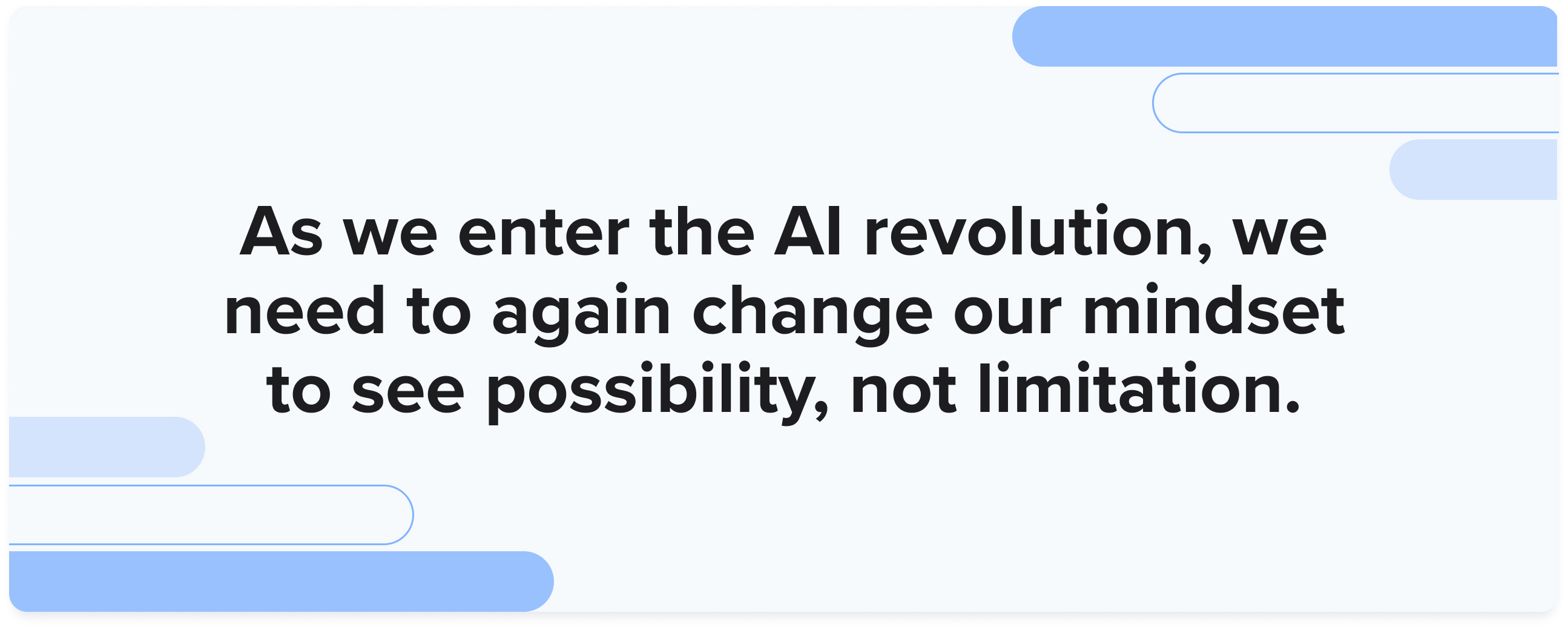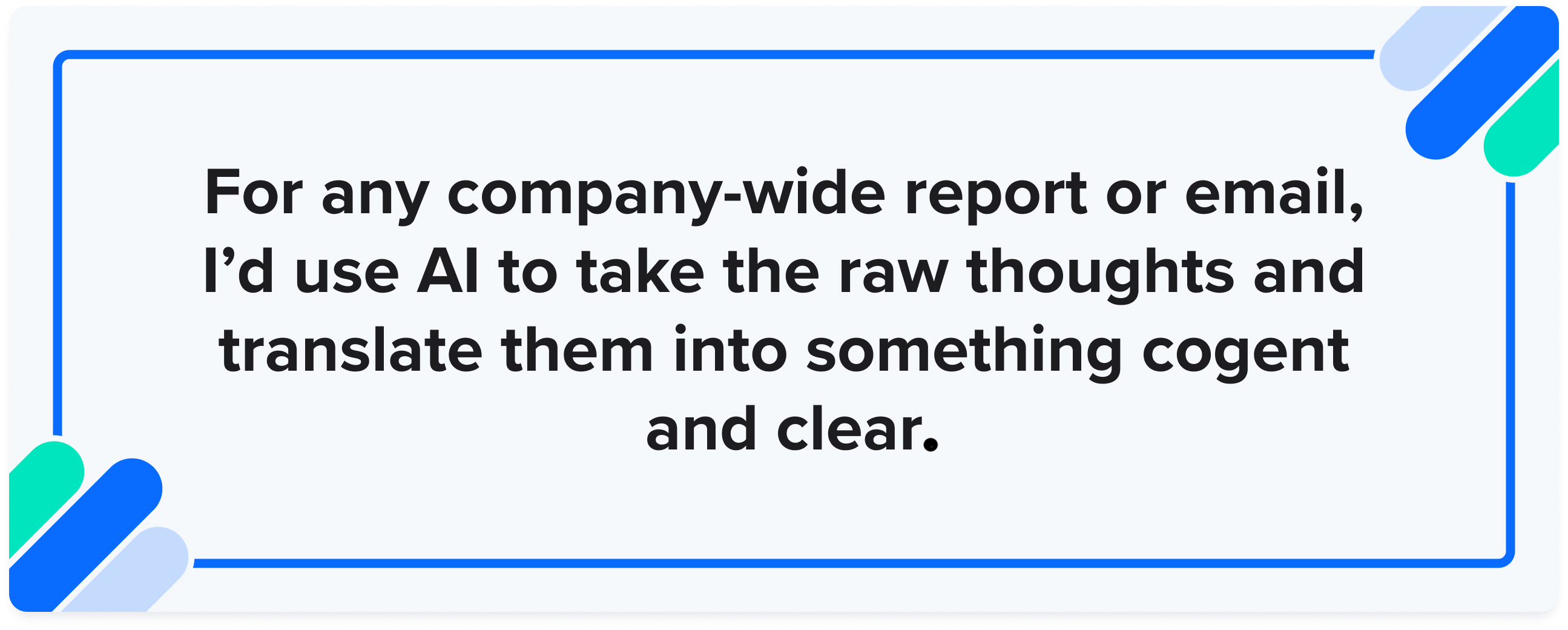Join 40,000+ sales and marketing pros who receive our weekly newsletter.
Get the most relevant, actionable digital sales and marketing insights you need to make smarter decisions faster... all in under five minutes.
When the pandemic shut everything down a few years ago, some businesses flourished and some shuttered.
While there were a million factors at play, a big one that didn’t get talked about too much was mindset.
In my opinion, the businesses that thrived were the ones to do what we call at IMPACT “Yes, and…”.
Yes, and is an improv classic in which actors have to adapt and move forward no matter what’s thrown at them. For businesses, we see Yes, and as a mindset that allows you to embrace the messy parts of a situation so you can find your way through it.

In the pandemic, this was the case when doctors pivoted to telehealth visits and restaurants to curbside pickup. Businesses that grumbled about having to learn Zoom were the ones who saw only threats, not opportunity.
As we enter the AI revolution, I think we need to again embrace yes, and. We need to again change our mindset to see possibility, not limitation.
Success with AI is not a skill set to master, it’s a mindset shift that should change our very approach to work.
4 principles for your AI mindset
I’ve written elsewhere about the guidelines I heard from Professor Ethan Mollick of UPenn, who has shared four principles for using AI. To me, they represent the AI mindset I’m talking about. The ideas below are his, but the words are mine.
- Use AI for everything you can. When you have any task in front of you, think about how AI can help you. Doesn’t matter if you’re cooking dinner or planning a vacation.
- Be the human in the loop. AI has astonishing abilities — and plenty of limitations. It is not a human with judgment and character. Be the human that makes up for these shortcomings.
- Treat the AI like a human and tell it who it is. This is big. AI can be whoever you want it to be, but only if you’re clear. So, tell it who you want it to be (savvy marketer, skeptical buyer, nervous invester, etc.). The better the input, the better the output.
- Remember, the AI you’re using today will be the most basic AI you ever use. It’s true. Things are advancing so quickly that what’s new today will be outdated in a month or two. Think about early TVs or early digital cameras. They seemed high-tech at the time, but the advancements came swiftly. Same thing here.
I’ve kept Mollick’s ideas in mind as I’ve done my own exploration. I suggest you do the same.
With that in mind, let’s look at some common business situations and think about how we can use AI to improve the work we do.
These are just the tip of the iceberg — one idea for each. But they represent the mindset I’m talking about: seeing opportunities to leverage AI to help you do your work better.
- Performance reviews: As a manager, I’d keep a doc going all quarter with thoughts and feedback I’d shared during the course of the quarter. Then, I’d use ChatGPT to comb through everything and pull together a coherent evaluation and actionable steps for growth that I could deliver in a performance review.
- Company communication: When it comes to company communication, if the message isn’t crafted just right, the meaning can get misconstrued. This is where LLMs shine. They’re programmed for clarity and neutrality.
So, for any company-wide report or email, I’d use AI to take the raw thoughts and translate them into something cogent and clear. For me, I’m long-winded by nature, so AI could help me pare down and simplify what I’m trying to say.
But again, be sure to tell it who you want it to be. If you want it to sound encouraging and friendly, say so. If you need to it be austere and formal, say so.

- Competitive analysis: Now that ChatGPT can read websites, you can feed it URLs from your top 10 competitors. Ask it about common themes. Ask it about gaps and opportunities. Tell it to pretend to be a customer (or an industry expert!) and then ask it about the marketplace.
- Go-To-Market strategy: A GTM strategy has a lot of moving parts, and AI can help you with many of them. Feed it your homepage copy and have it evaluate your messaging.
Have it describe your target buyer, and explain common problems that person faces. Ask it about a marketing plan. Ask for the steps of a potential sales process. - Employee compensation: ChatGPT can find and synthesize data that would take you hours to dig up. Ask it for benchmark data in your industry. You can ask for a chart that organizes the information by years of experience, certifications, degrees, or any other metrics that matter.
Remember that some LLMs do not keep your data safe. So, either verify ahead of time that you’re using a secure tool — or just take names and personal details out.
For any one of these, is AI going to solve the problem on the first try? No way. But it will definitely get you past the staring-at-a-blank-page stage. And it might get you 70% of the way there.
The idea is that AI is an assistant that can help us move faster.
Remember, what’s listed above just scratches the surface, but when you change your mindset, you start to see opportunities everywhere.

And that’s what this is about. AI is a multiplier. But only if you start looking for ways to use it.
Change your mindset, grow your company
I work with a dozen companies, and they’re in a dozen different places when it comes to AI. Some are all-in, embracing this very mindset. Some are way far back, clinging to the way they’ve always done things, unsure how to move forward. (Or, even worse, waiting for the AI fad to pass.)
Here’s the thing, if you’re a company leader, or you’re a Gen X-er or millennial who’s weirded out by all this, that’s okay. You don’t have to be the AI expert for your company. But if you’re in a leadership position, you should give people the green light to explore, to think differently, to change their mindset.
To help you get ready to do this, check out this full list of AI guidelines and best practices my colleague Marcus Sheridan put together.
If you need more help getting your team on board — or getting yourself on board — talk to us! We can make this overwhelming change feel manageable and, honestly, pretty fun.


Register for IMPACT Live in Hartford CT, October 14-16!
